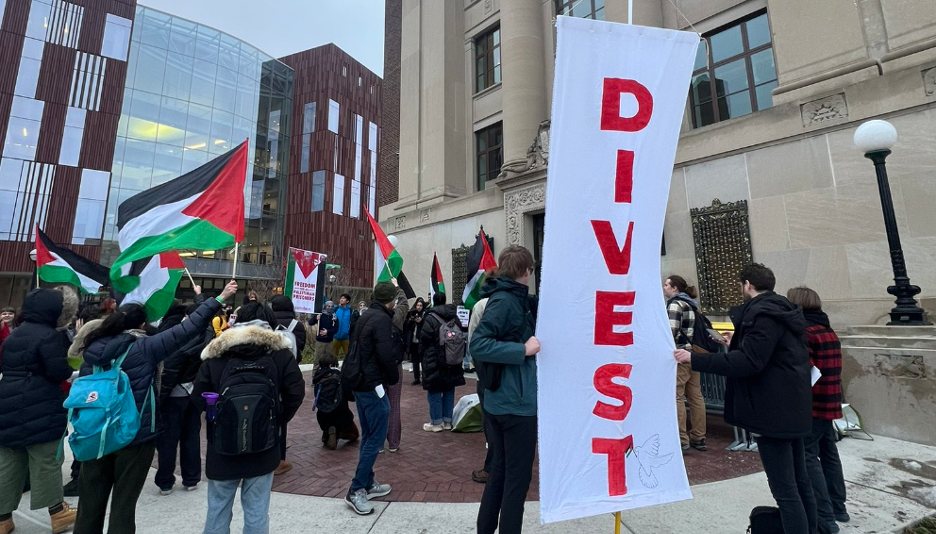The University of Michigan Faculty Senate passed a measure Monday calling for “the University’s leadership, including the Board of Regents, to divest from its financial holdings in companies that invest in Israel’s ongoing military campaign in Gaza.” The statement referenced reports published by The Guardian, Haaretz, The Washington Post, Amnesty International, and Human Rights Watch, all of which have highlighted the unprecedented rate of civilian deaths in Gaza, and that American financial sources are central to Israel’s ongoing genocide.
The vote built on broad organizing work on campus and across the community by Students Allied for Freedom and Equality (SAFE), the TAHRIR Coalition, and Faculty and Staff for Justice in Palestine, among others. During voting, a large group of students held a vigil outside.
The faculty statement referenced precedents for divestment, pointing to the University of Michigan’s 1983 divestment from companies doing business with South Africa’s apartheid regime and its more recent decision to “exit” its investments in Russia in response to the war in Ukraine.
A motion to refer questions of divestment to the Financial Affairs Advisory Committee was brought to a vote by opponents of divestment. However, this motion — largely seen as a measure to effectively drown the movement for divestment — failed.
The University of Michigan’s recent history of investment in oppressive regimes is deeply problematic. Though supporters of divestment tried to garner support from the university by appealing to its history cutting ties with the apartheid government in South Africa, Professor Derek Peterson, the sponsor of the current divestment resolution, noted that,
Michigan was on the wrong side of history in the 1970s and 80s, when leadership resisted student demands to divest from companies that did business with apartheid South Africa. It took extraordinary measures–an act of the state legislature–to finally get the University’s leadership to agree to divest–and even then, they did so with great reluctance.
Peterson offered a hopeful appraisal after the faculty senate passed the resolution:
The motion passed by the Assembly this week builds on a basic principle: that being the ‘leaders and the best’ is an ethical vocation, not only an academic or athletic mission. I hope that the Regents see in the resolution an opening to reconsider Michigan’s position, and to accept that our money should not be used to fund a bloody, inhumane war.
However, it is unclear if the Board of Regents, made up of six Democrats and two Republicans, will seriously consider the university’s connections with groups investing in Israel’s mass slaughter of Palestinians. In 2017, after the Central Student Government passed a measure asking for the formation of a committee to investigate options for divesting from companies involved in Palestinian human rights violations, the Regents refused to even consider such requests. The university administration and Regents have also ignored several Freedom of Information requests and a recent measure passed by the Faculty Senate, “asking for the university to assess and publicize the financial investments by the University in the State of Israel.”
To further cast doubt on the likelihood that the university is planning on taking the measure seriously, Geoff Chatas, the University of Michigan chief financial officer, spoke at the Faculty Senate meeting, noting that “It has been the university’s unwavering policy to shield the endowment from political pressures and to base its investment decisions on financial factors such as risks and return and applicable law,” adding that the elected Board of Regents who oversee the university governance and its multi-billion dollar endowment should only consider “the university’s financial health and its mission-centric investment philosophy.” He reminded faculty that “just as recently as this last fall, when we were approached to consider the topic at hand, the Board decided to reaffirm that they would not take up the topic of divestment in Israel at this time.”
There are several important lessons to take away from the Faculty Senate vote and the university administration’s response. The most obvious is that, for administrators of large capitalist research institutions, war profiteering is acceptable, so long as it is very profitable.
Another is that, despite widespread claims that university protests against Israel’s rampant human rights violations are motivated by antisemitism, the Faculty Senate resolution was explicitly limited to Israel’s military and included language insisting that,
this Senate Assembly call for divestment is not a request to end support, academically or financially, for any of U-M’s partnerships with Israeli colleges or universities or to otherwise imply ending any assistance provided to faculty and students in support of research and education in Israel.
Image: @venus.jefferies
While it would certainly not be antisemitic to call for divestment from Israeli universities or for divestment from Israel completely, the Faculty Senate’s call for targeted military divestment seems strategically aimed to both avoid such criticism and to steer clear of the State of Michigan’s anti-BDS laws and disciplinary action from the university itself, which, in the past few years, has punished faculty and graduate students who cited divestment language in their refusals to write letters of recommendation for students applying to programs in Israel.
Finally, the Faculty Senate vote in favor of divestment shows that, with concerted efforts, even traditionally reticent representative groups can be convinced to speak out against atrocities and those who support them financially. It will be important to build on this coalition-building momentum going forward, both to continue to put pressure on the university administration and Regents to call for a free Palestinian state and to follow through on divestment, including divestments that go beyond the military sector, targeting the entire colonial endeavor oppressing Palestinians.










